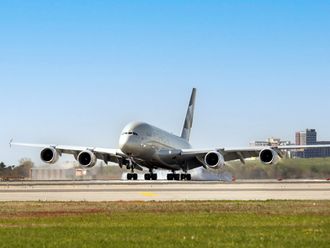Dubai: Raytheon Company plans to partner with a Saudi electronics firm to grow its presence in the Gulf, part of a push to expand global commercial sales, its international chief executive said this week.
Raytheon, one of the largest US arms makers, announced an agreement at the Dubai Airshow with Riyadh-based Advanced Electronics Co (AEC) to explore collaboration on weapon systems, integrated sensors, civil aviation and cybersecurity.
“We see significant growth in the international marketplace, and the GCC figures prominently in that growth plan,” John Harris, the chief executive of Raytheon International, said at the air show on Wednesday, referring to the Gulf Cooperation Council group of countries.
The Gulf region is the largest market driver in the arms industry, buying billions of dollars of military equipment each year. Saudi Arabia spent $7.7 billion (Dh28 billion) in 2014, more than double any of its neighbours, according to research firm IHS.
Saudi Arabia uses the Raytheon Patriot missile and air defence system, and was recently cleared to receive $5.4 billion in new PAC-3 missiles built by Lockheed.
Raytheon and AEC already work together on manufacturing of components for the kingdom’s program to buy F-15 fighter jets from Boeing Co.
The agreement reflects Raytheon’s new focus on building partnerships with local firms in targeted markets, and expanding into related commercial fields, instead of focusing on single weapons programmes as it has in the past.
“Our play [in Saudi Arabia] is not only in the defence sector, but also in the commercial marketplace,” said Harris, citing cybersecurity and air traffic control as prospective growth areas for international sales.
Harris said Raytheon had nine customers in Saudi Arabia, but gave no details on its sales in the kingdom. He said the GCC figured prominently in Raytheon’s plan to keep expanding foreign sales, which already account for 30 per cent of total sales.
Government clients
Raytheon has also invested heavily in building its cyber capacity in recent years, making several acquisitions in the cyber market over the past decade, said Harris.
Earlier this year, Raytheon bought network security provider Websense in a deal worth $1.9 billion, adding more than 20,000 commercial customers to its predominantly government clients to address private sector data breaches.
AEC, which splits its business evenly between commercial and military work, has also moved into the cybersecurity market in recent years, spokesman Khalid Turki said.
AEC has clients in the defence, telecommunications and industrial sectors, including state-run oil giant Saudi Aramco, which was hit by a crippling cyber attack in 2012 that damaged some 30,000 computers.
Harris declined to comment on whether Raytheon’s partnership with AEC might include projects at Aramco.












